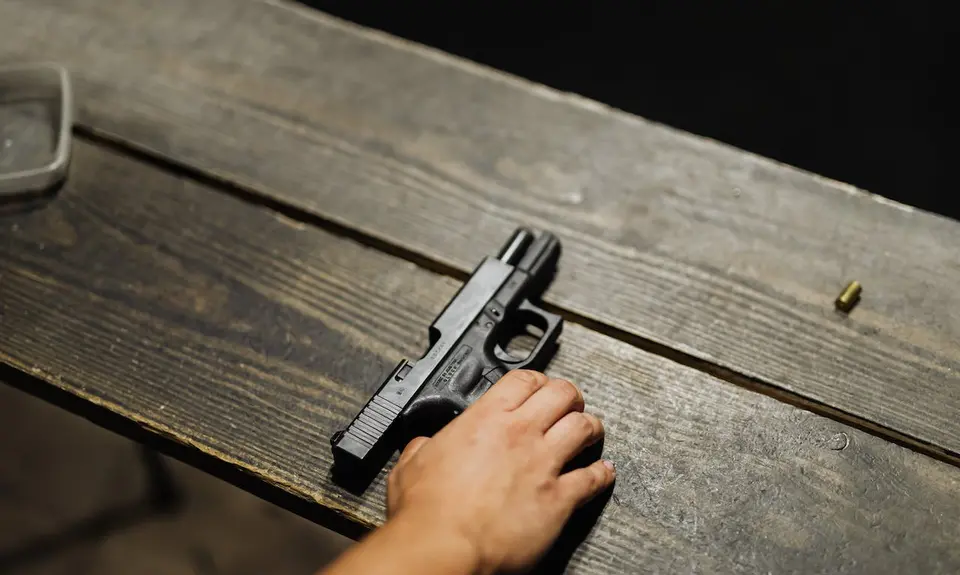One of the many concerning cases before the Supreme Court this term could be extremely dangerous for victims of domestic violence. US v. Rahimi is a case about whether people subject to restraining orders have a constitutional right to own guns. Along with Garland v. Cargill, a case about “bump stocks” which the Court recently decided to take up, US v. Rahimi will have a huge impact on gun violence prevention efforts in this country.
To explain exactly what’s at stake in this case, we asked People For Senior Legislative Counsel Paul Gordon a few of our most pressing questions.
What’s the key question in this case?
The constitutional question is whether someone subject to a domestic violence restraining order has a constitutional right to have guns. The real-world question is whether we can keep guns out of the hands of people who have already committed acts of intimidation and violence against family members.
What’s the background of this case, and how did it get to the Supreme Court?
Zackey Rahimi assaulted and threatened his girlfriend. In 2019, she was able to get a restraining order against him. Under federal law, it’s illegal for someone subject to a domestic violence restraining order to possess firearms.
In 2020 and 2021, Rahimi was involved in five different shootings. When police searched his home, they found guns. He was convicted for possessing them while subject to a domestic violence restraining order.
He appealed, claiming that this violated his Second Amendment rights. In June 2022, the Fifth Circuit Court of Appeals ruled against him. But two weeks later, the Supreme Court issued a decision in a case called New York State Rifle & Pistol Association v. Bruen. The far-right majority completely changed how courts analyze Second Amendment cases in a way that severely undercut reasonable restrictions on firearms. So the Fifth Circuit reconsidered its ruling against Rahimi, and this time they ruled in his favor.
What’s the Bruen standard, and how does it affect this case?
In Bruen, the far-right majority created a new type of analysis for all firearms safety laws. Before, judges had balanced the individual’s right to own and carry firearms with the urgent need to prevent gun violence. That approach is no longer possible. Under Bruen, judges are required to strike down gun safety laws unless a comparable law existed at the time the Second or Fourteenth Amendments were adopted.
Access to a gun makes it five times more likely that a woman will be killed by her abuser. That’s why we have a law barring gun ownership by people subject to domestic violence restraining orders. But Bruen makes it harder for judges to take into account the compelling need to protect victims of domestic violence from their armed abusers.
What does this case tell us about the importance of lower courts?
The Supreme Court is important. But after the headlines on its latest decisions fade, it’s up to lower federal courts to interpret and apply them. After a bad Supreme Court decision, some judges look for ways to limit our rights even more. That’s what happened in this case.
A Fifth Circuit panel made up of two Trump judges and a Reagan judge took the Bruen decision and made it even worse. Under Bruen, they had to look for historical analogs to the current gun safety law. But they defined “historical analog” about as narrowly as possible, virtually guaranteeing that they would not find any.
They asked if there were laws in the 1780s or 1860s keeping guns out of the hands of people engaged in domestic violence. Not surprisingly, they didn’t find any. When the Second Amendment and Fourteenth Amendment were adopted, married women weren’t full people under the law. They couldn’t own property in many states. They often didn’t have a right not to be beaten or raped by their husbands. Women didn’t have a right to vote to change the laws so they could be protected from their violent husbands. Women didn’t have a right to vote on whether to adopt the Second or the Fourteenth Amendment.
This case is a prime example of why it matters who gets confirmed to all federal courts, not just the Supreme Court.
How could the decision in this case affect people?
If the Supreme Court upholds the Fifth Circuit’s decision, it would especially impact anyone who has been terrorized by spouses and domestic partners. Violent people who assault or threaten vulnerable members of their families would have a constitutional right to guns, adding to the deadly threat that those family members already live with.
Thanks, Paul!
With so much on the line during this Supreme Court term, it’s important to stay informed on the cases and how they could impact us all. People For’s recent report, Another Dangerous Term Begins at the Supreme Court, outlines the key cases we’re watching and why they’re so important.
We couldn’t do this vital work without the help of our members and supporters. To help us continue monitoring the Supreme Court and providing expert analysis on the cases at hand, please consider donating and becoming a member of People For the American Way.
